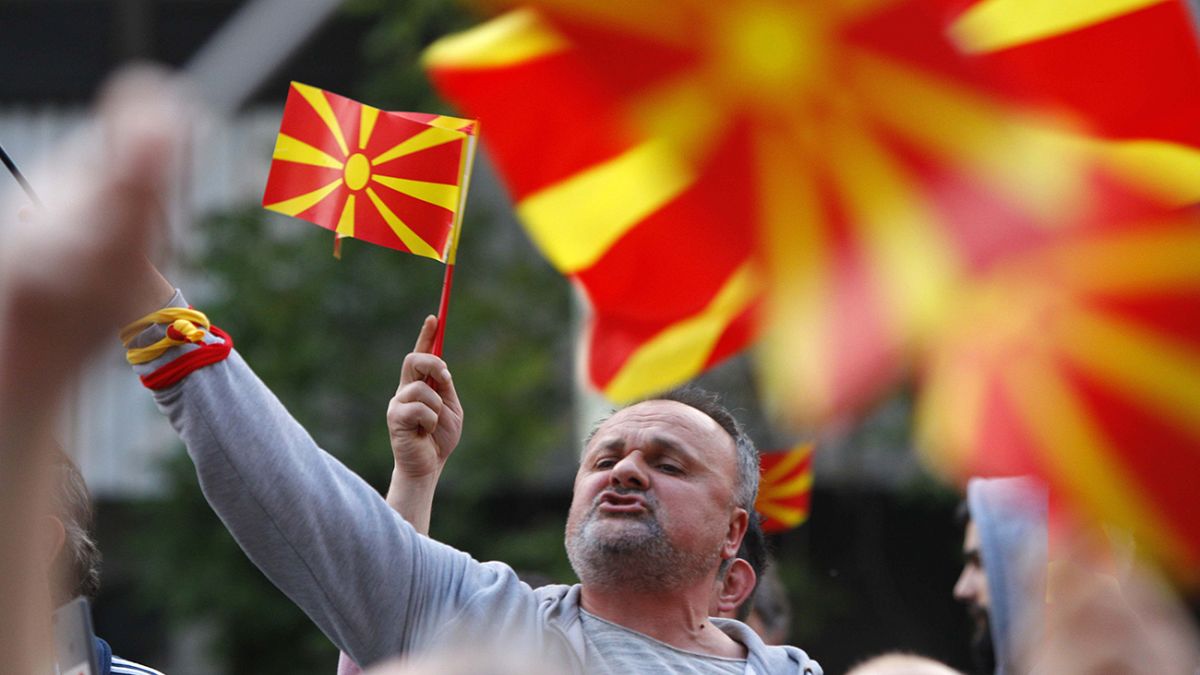A long-lasting constitutional crisis in the Former Yugoslav Republic of Macedonia reached a climactic point Thursday night as the election of a speaker by the country’s new parliamentary majority turn
A long-lasting constitutional crisis in the Former Yugoslav Republic of Macedonia reached a climactic point Thursday night as the election of a speaker by the country’s new parliamentary majority turned bloody with hundreds of protestors storming the building and attacking the representatives in an unprecedented display of violence.
At least 100 people were injured including 22 police officers, according to the police reports. These include opposition leader, Social Democrat Zoran Zaev, 42, who required stitching and the leader of the Albanian Alliance Zijadin Sela who was reportedly clubbed unconscious by an angry mob which included armed and masked people.
In a press conference on Friday, Zaev described the events as “attempted murder,” done with the consent of former Prime Minister Nikola Gruevski and the country’s President Gjorgje Ivanov.
The election of the first ethnic – Albanian Talat Xhaferi as speaker was an attempt by the new parliamentary majority to unblock the constitution of a new government almost five months after 11th of December elections which has been continuously blocked by Ivanov – seen by many as Gruevski’s man – who has refused to let Zaev form a government in coalition with the country’s largest Albanian party DUI- the Democratic Union for Integration, citing the partnership as one that is endangering the country’s unity.
The crisis started when the previous government, in which the nationalist VMRO-DPMNE party shared power with DUI, was involved in a wiretapping scandal which included the communications of at least 20,000 of its citizens’ communication being followed for several years.
The revelations were first made in the spring of 2015 by Zaev, who had received the wiretapped conversations from a Ministry of Interior whistleblower; their publication along with every day protests of citizens which have evolved into a popular movement called the Colorful Revolution, triggered a two-year-long crisis which resulted in the foundation of a Special Prosecutor’s Office aimed at investigating the wiretaps.
The tapes revealed astonishing levels of corruption and misuse of power, including the blurring of the lines between the ruling party and institutions such as the police.
The Thursday events might have given further credence to such claims, after police were almost nowhere to be seen during the scandalous events, with the parliament building left virtually unguarded. Such unpreparedness is symptomatic after the building has been an end point for daily protests against the new parliament majority, which started after former Prime Minister Gruevski asked “the people to defend their country” back in February.
A 2016 agreement between the country’s four biggest political parties – which in addition to VMRO-DPMNE and the Social Democrats include two parties representing the Albanian population, the DUI, and the Albanian Democratic Party – resulted in the elections of last December, having originally been planned for 24 April and later 5 June.
As part of the agreement, VMRO-DPMNE’s leader Nikola Gruevski resigned from the position of Prime Minister.
During Gruevski’s stint at the head of the young republic between 2006 and 2016, the country has seen a decline in media freedoms, political prisoners and has been described as “not free” by Freedom House. It has also been ranked 111 out of 180 countries in Reporters Without Borders’ 2017 Press Freedom Index – the lowest in the region and staggering when the 2008 ranking of 42nd is taken into account. Many have seen Gruevski’s resignation as a publicity stunt, with the 46-year-old believed to still assert a significant level of control over the police and the intelligence services. In a live televised interview on Friday, Zoran Zaev claimed that the masked people who broke into the parliament the day before were in part policemen still controlled by Gruevski, in part ex-convicts recently pardoned by President Ivanov.
In a press conference on Friday, the Minister of Interior, Agim Nuhiu, stated his intention to resign from the position, but not before he would ensure “a peaceful transition of power.” Nuhiu, who has been the Minister since December’s election had stated his dejection at not having been able to prevent the events which unfolded the night before, but more importantly, that he did not manage “to cleanse the Ministry from party influences.”
VMRO-DPMNE deems the election of Talat Xhaferi to the position of the parliamentary speaker as a provocation which enraged the crowds storming the building. Xhaferi was a commander in the Albanian paramilitary organization UCK, which led an uprising against the Macedonian state back in 2001.
The conflict ended with the Ohrid Agreement, and it was out of UCK’s political wing that the Democratic Union for Integration was born. The party has shared power with VMRO-DPMNE between 2008 and 2016 with Xhaferi himself serving as a Minister of Defence from 2013 until 2014.
by Ilinka Iljoska
